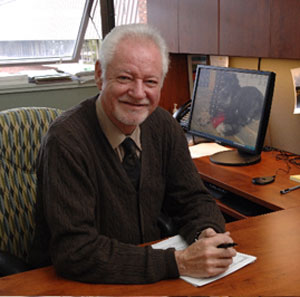 |
| George Turnbull. (Danny Abriel Photo) |
When Dr. George Turnbull was a young man he followed a girl to Africa. At that time he was a physiotherapy student from the Royal Infirmary in Glasgow, Scotland.
He worked clinically for a while in what was then Rhodesia. The land was gorgeous. He enjoyed it there, but his education needed completing. So he moved on to the University of Manitoba.
From there, he continued on to ŗŚĮĻ³Ō¹ĻĶųfor his masterās degree, and then returned to Africa for his PhD from Rhodes University in South Africa. Now heās back at Dalhousie, where he's been for the past 30 years, as the Associate Dean in the Faculty of Health Professions.
Dr. Turnbull believes in serendipity.
When he first began his physiotherapy research, it was centred on rehabilitating stroke victims. But one day, a Parkinsonās group asked him to bring some of his ŗŚĮĻ³Ō¹ĻĶųstudents out to provide physiotherapy. āSo I did that,ā says Dr. Turnbull. āAnd before long it was becoming a regular occurrence and I thought, ±Ź²¹°ł°ģ¾±²Ō²õ“Ē²Ōāsā¦ā.ā
Parkinsonās is a progressive neurological disease affecting an estimated 8,400 people in the Maritimes. Dr. Turnbull describes this as a disease characterized by stiffness of muscle, slowness of movement, loss of balance and various other symptoms. āI started to think about (Parkinsonās) and how you might deal with a group of people who were actually going to deteriorate over time,ā says Dr. Turnbull. āOne of the things that I came up with is that if we could see people with Parkinsonās early, shortly after the diagnosis, we could get them exercising.ā
Dr. Turnbull believes in building up a patientās endurance and strength so that when they start to lose to the condition, they have more to draw upon. Medication, Dr. Turnbull believes, is not the only way to combat Parkinsonās.
This is an approach he calls āhealth promotionā and he educates Parkinsonās patients about it at his free Maritime Parkinsonās Clinic.
Carole A. Hartzman has been one of Dr. Turnbullās patients at the clinic for the past seven years. āHe operates outside of the box,ā explains Ms. Hartzman. āHe thinks creatively.ā Exercise is the most important factor at the Maritime Parkinsonās Clinic, but fun is a very close second.
Sometimes he surprises patients by advising dance lessons to help with balance, or voice lessons to maintain vocal chords.
In a sense, this sort of customization is also the way Dr. Turnbull approaches things in the kitchen; cooking is another one of his passions. He starts his culinary creations from scratch, regarding recipes as a broad guideline. āIām not talking curry powder here,ā Dr. Turnbull begins. āIām talking ground cumin, ground coriander, garam masala, ground-up turmeric. The whole thingās from scratch, thatās the fun part.ā If you havenāt yet guessed, he really likes cooking Indian and Middle Eastern dishes.
He learned to cook when he couldnāt find theĀ kind of restaurants he liked. Now he spends the better part of his weekends at home hovering over the stove with his family close by.
Speaking of family, Dr. Turnbull is about to become a grandfather.
But in terms of his Parkinsonās research, the topic of passing on the torch to the next generation is not quite so pleasant. āThe difficult part is itās not very sexy for the new people coming along,ā says Dr. Turnbull. āBringing up the next generation in terms of succession planning has not been easy.ā
This places even more importance on fundraising efforts such as the Parkinson Society Maritime Regionās annual fundraising gala. The gala, which took place last night (Thursday, May 20),Ā paid tribute to Dr. Turnbull as a Parkinsonās pioneer.
Yes, Dr. Turnbull has an intimate understanding of Parkinsonās and its effects on the body. But his response to the fright of Parkinsonās may surprise some. āItās not as terrible as you might think,ā he says. āI say to (the patient), āyou know, of all the neurological diseases, this is the one to have because at least itās manageableā.ā
To learn more about Parkinsonās disease and the Parkinson Society Maritime Region, please visit .
